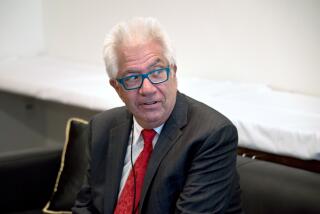Reed Irvine, 82; Created Group to Confront Perceived Bias in Media
- Share via
Reed Irvine, the obstreperous gadfly who 35 years ago founded Accuracy in Media, an organization devoted to exposing perceived liberal bias in American journalism, died Tuesday of complications from a stroke at a rehabilitation center in Rockville, Md. He was 82.
An economist for the Federal Reserve when he launched Accuracy in Media in 1969, Irvine pilloried the news media through a syndicated column, countless letters to the editor and fearless interrogations conducted in the boardrooms of the nation’s major newspapers and broadcast networks.
Lions of the media establishment were his favorite targets, including Walter Cronkite, who he suggested was a Soviet dupe for coverage of the Communist superpower that Irvine viewed as overly sympathetic. He also was a long-standing critic of Dan Rather, the object of an AIM campaign called “Can Dan” that he launched 16 years ago and is still going strong, bolstered by the veteran CBS newsman’s recent on-air apology for errors in a network report on President Bush’s National Guard record.
Another AIM campaign focused on biases perceived in a 1983 PBS documentary, “Vietnam: A Television History.” PBS responded to Irvine’s criticisms by granting his group an hour of airtime for rebuttal.
“I used to call him the pit bull,” L. Brent Bozell III, founder of the Media Research Center, another conservative media watchdog group, told The Times on Thursday. “When Reed deemed something important, he would sink his teeth into it and not let go.”
AIM eventually bought stock in media companies, which allowed Irvine to take his arguments against them right into their annual shareholder meetings.
He was so disruptive at New York Times shareholder meetings in the 1980s that he was given annual private chats with the paper’s top brass, who were anxious to avoid his public pontifications.
At the Washington Post, he was nearly ejected from a shareholders’ meeting in 1984 when he rattled off the 18 letters he had written to the paper over the previous eight months.
Such antics, and his frequent attacks on individual stories and reporters, so enraged Washington Post Editor Ben Bradlee that the latter fired off a letter in which he called Irvine a “miserable, carping, retromingent vigilante,” and added that he was “sick of wasting my time in communication with you.”
Irvine may have had to consult a dictionary to fully appreciate Bradlee’s insult, which included a medical term for urinating backward, but he nonetheless “proudly displayed the letter on his conference room wall, along with scores of awards and plaques for service to his country and its citizens,” according to his official biography on the AIM website.
Irvine was a native of Salt Lake City who graduated from the University of Utah in 1942 at age 19. He joined the military at the outset of World War II and was chosen to take a crash course in Japanese, which qualified him as an interpreter/translator with a commission in the Marines. He served as an intelligence officer in Saipan, Tinian and Okinawa and later during the U.S. occupation of Japan from 1945 to 1948.
At the conclusion of his military service, he won a Fulbright scholarship and studied economics at Oxford University. In 1951, he joined the Federal Reserve Board as an economist specializing in Asian affairs.
He headed luncheon discussion groups for the International Economists Club and the Arthur G. McDowell Luncheon Group, named in honor of an anti-Communist union leader.
During one of those luncheons in 1969 at which the topic was perceived bias against the Vietnam War in nightly news coverage, Irvine hatched the idea for Accuracy in Media, an organization that would confront error and distortion in the news media. It was launched that same year with a $200 donation from a retired businessman.
Within a few years, AIM was making waves. In 1972, ABC issued five corrections to a documentary about the arms race after Irvine’s steady and pointed complaints. The following year, AIM and its leaders were featured on the front page of the Wall Street Journal. In 1985, he launched a sister organization, Accuracy in Academia, to root out leftist leanings in college and university courses.
“He was a pioneer of the liberal bias argument,” Michael Hoyt, executive editor of the Columbia Journalism Review, said Thursday. “He opened the discussion ... and [that] was a useful thing. There is such a thing as liberal bias. He just raised the issue, which was a kind of victory in itself.”
Irvine is survived by his wife, Kay; a son; and three grandchildren.
More to Read
The biggest entertainment stories
Get our big stories about Hollywood, film, television, music, arts, culture and more right in your inbox as soon as they publish.
You may occasionally receive promotional content from the Los Angeles Times.











